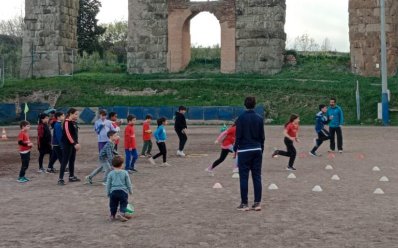Non Profit Digital Leaders

Duration: 15 months: 25 March 2025 - 24 June 2026
Territory of intervention: The project has national scope
Applicant / Coordinator: SocialTechno Impresa Sociale srl (TechSoup)
Partners:
- UISP Aps
- Agorà /Social Cooperative Society
- Altri Colori / Social Cooperative Onlus
- NEW HUMANITY ETS / International Association
- Cooperativa Sociale Società Dolce / Social Cooperative
- Cooperativa Sociale Spazi Nuovi / Social Cooperative
- EQUA / Social Cooperative
- Fondazione Istituto Sacra Famiglia Onlus
- I. F.O.A. (Institute for Training of Business Operators)
- Il Faro /Social Cooperative Society
- La Nuvola Società Cooperativa Sociale -Social Enterprise Onlus
- Percorsi di secondo welfare /Social Enterprise Cooperative Society
- SEACOOP /Social Cooperative Society
Funding body: Fondo per la Repubblica Digitale – Impresa Sociale (Digital Republic Fund – Social Enterprise)
SUMMARY:
As is known, "digital maturity" is the construct that describes the different levels of adoption of digital technologies (IT adoption). It represents the combined result of knowledge, skills and abilities.
The ability of an organization to undertake impact-oriented digital transformation paths depends directly on its digital maturity, influenced by the digital maturity of individuals. It is therefore essential to work on the latter to develop effective digital transformation paths, capable of strengthening the "knowledge" component of digital maturity.
Since digital maturity is a context-specific concept, that is, it depends on the context, any training intervention aimed at increasing the level of knowledge must necessarily be customized according to the specificities of the organizational and individual context.
From this need arises a first gap, which is the basis of the proposal: it is necessary to develop personalized training courses based on the characteristics of each organization and, even more, of each individual. However, this need clashes with economic limits (the costs are high) and operational limits (customization is not easily replicable on a large scale).
To respond to these critical issues, the "Train The Trainers" (TTT) intervention method was adopted, divided into two phases:
- Training of a group of Digital Leaders, selected by the individual participating organizations;
- Activation, by the trained Digital Leaders, of ad hoc paths addressed to employees and volunteers of their organization.
Training, addressed to 73 Digital Leaders, is aimed at strengthening both digital skills and the complementary skills specific to the role of each DL (leadership, teaching methodologies, etc.). The Digital Leaders thus become part of an expert group led by TechSoup, with the aim of sharing good practices and tackling common challenges. A large final event in person, dedicated to them, is also planned.
The overall objective is to enable Digital Leaders to develop specific training content for their organizational context, so that training is truly effective and can reach a large number of beneficiaries. The project in fact provides for the delivery of 100.855 hours of training, organized in a dedicated training catalog consisting of 80 modules, involving 5.124 employees and volunteers. At the end of the course, a Certificate of acquired skills is issued, thanks to the support of the partner IFOA, an accredited training body.
The project also includes the development and implementation of an integrated digital environment, available to organizations even after the project has ended. This environment includes features for training delivery, access tracking, monitoring of the level of use and evaluation of outcomes. In addition, there is the function of measuring digital maturity pre and post intervention, through a dedicated model, capable of promptly detect gaps in knowledge, skills and abilities fillable through training.
OBJECTIVES:
- Verify the effectiveness of the “Train The Trainers” (TTT) model to accelerate the digital transformation of the third sector. In a first phase of the project, a cohort of subjects intending to become Digital Leaders of their organizations is trained, that is, to implement for their organizations ad-hoc training courses that respond to the real “local” digital training needs, in a “peer-to-peer” mode.
- Define a “training catalogue” within which each organisation can select the modules to be used by their employees/volunteers and further “personalised” and “contextualised” by the Digital Leaders for their “colleagues” in the second phase of the project.
- Promote and experiment in for-profit organizations the introduction of the innovative figure of the Digital Leader, as an internal and “proximity” figure to increase their speed of adaptation to the changes imposed by digitalization and digital transformation and who guides (leader) the transition process with respect to the adaptation of digital skills: a process that does not end with the project, but must continue over the years - the project trains these figures and provides them with the necessary tools also in the coming years.
PROJECT ACTIONS:
- Phase 1: Involvement of beneficiaries
- Phase 2: Communication
- Phase 3: Digital Maturity Assessment
- Phase 4: Training
- Phase 5: Management and monitoring
- Phase 6: Reporting
- Phase 7: Digital solution
EXPECTED RESULTS:
- Experimentation of the introduction of 73 Digital in Third Sector organizations;
- Acquisition of a broad vision of the transformation processes in progress and not a training in the digital field limited to the use of individual digital tool;
- Production of context-specific training content (and therefore much more effective than generalist ones) and to become a point of reference for digital transformation;
- Design and development of effective digital training plans for the organization of belonging;
- Increase in digital skills and complementary skills (soft/life skills) of 5,124 workers operating in the Third Sector, through the provision of 100,855 hours of training;
- At the end of their training courses, issue to the beneficiaries the relative Certificate of Transparency of Skills in which the knowledge and skills acquired will be reported, as codified in the National Atlas of Qualifications or in the European Framework DigComp;
- Development and testing of a robust digital skills measurement model that guides training interventions (Digital Maturity Assessment);
- Testing of the measurement model during the project, with the involvement of all project beneficiaries (5,124), and thus providing a first large database that will constitute an initial knowledge base, the results of which will be useful for starting a permanent observatory on digital maturity in the third sector;
- Testing of an impact model that can be extended from the original pilot (11 organizations) to other organizations throughout the country.
Ufficio progetti - Sede Uisp Nazionale
L.go Nino Franchellucci, 73 00155 Roma
Tel.: +39.06.43984350 - 345 - 346
Fax: 06.43984320
e-mail: progetti@uisp.it








